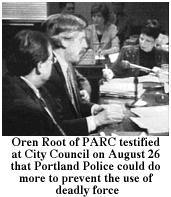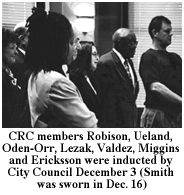Shootings Review Questions Police Tactics
...While the "Independent" Police Review Division Regroups
The last four months of 2003 were a busy time for the "Independent" Police Review Division (IPR). The Los Angeles-based Police Assessment Resource Center (PARC), hired in 2002 by the IPR to review police shootings and deaths in custody in Portland, released their long-awaited report on August 26. While the 200-plus page report made serious charges against the Police Bureau for its investigative techniques and follow-up after deadly force incidents, only one third of its 89 recommendations had to do with officer behavior on the streets. Meanwhile, the IPR is struggling to catch up with an increasing backlog of citizen complaints and to resurrect its Citizen Review Committee (CRC) after five of nine CRC members resigned in August (see PPR #30). In mid-November, six weeks behind schedule, IPR Director Richard Rosenthal and Auditor Gary Blackmer, whose office contains the IPR, announced the names of the new CRC members.

The PARC report was the compromise that the City Council approved between Auditor's desire to avoid dealing with deadly force cases altogether and the community's call for the CRC to be allowed to review such incidents. The Council seems proud of the fact that this is one of the only such comprehensive reviews done in the country without the imposition of a federal mandate to do so. However, they forgot to acknowledge that the community's demands after the shooting of José Mejía Poot in 2001 led the Council to instruct Blackmer to come up with some way for the IPR to review shootings (PPR #24).
PARC was eventually able to review nearly all of the information on these cases despite the fact that the Bureau had destroyed or lost many of the documents they sought (see PPR #30). It turned out that when the press revealed efforts by Director Rosenthal to cover up the missing documents ("Oops! Errant e- mail shows city failed to keep all records on cop shootings," Portland Tribune, July 4), Bureau employees in the Identification Division came forward with roughly 5000 photographs and videotapes. In other words, if Rosenthal had come forward earlier with the fact that this evidence was missing, PARC would not have had to wait until the last four weeks of their 10- month review to look at all of it.
While mainstream media referred to the PARC report as "scathing," the mostly benign report compliments the Bureau for its handling of some of the 32 cases, praises some of their investigative checklists, and exonerates them by declaring "The files on the 32 PPB incidents we reviewed gave no indications of the gratuitous use of firearms or other weapons, or of racial or ethnic bias." The question of possible racism was raised by members of the community when PARC began its process in October, 2002, even prior to the most recent two shootings of people of color--Kendra James and Eddie Homsombath. The report was quick to dismiss this issue despite its own statistics showing Latino and African Americans being shot at with more than twice the frequency of their representation in the population (29 percent of suspects shot versus 13.4 percent of the population).
Similarly, PARC softballed its recommendations to increase de-escalation of situations by only suggesting the Crisis Intervention Team (CIT, which is trained to deal with suspects who appear to be mentally ill) be better "deployed." Copwatch has urged‹and the Mayor has agreed‹that all officers should receive CIT training. The City claims they do not have enough money for this training, yet are willing to spend tens of thousands of dollars on weapons (see "Tasers" update).
The report did highlight that most police shootings cases did not conclude with an organizational review to see whether tactics, training and policies need to be reconsidered. It stated that in some cases, officers unnecessarily put themselves in harm's way, resulting in the use of deadly force. It condemned practices that allowed officers to be interviewed without being tape-recorded. Of the 89 recommendations, Chief Foxworth says the Bureau has implemented 40 (although we only see 16, since many of the recommendations Foxworth labelled "done" are those which require improvements or ongoing monitoring). Luckily, he has put on the back-burner the idea of purchasing a police helicopter, which does little to improve community- police relations, and, as felt in other cities, only adds to the sense of police as an occupying force.
While many point to the report as one reason Chief Kroeker resigned (see article), its scope mostly covered the tenure of former Chief Moose, who left Portland in late 1999. Fearing that discovering similar flaws in more recent cases might lead to lawsuits, the City only allowed PARC to review cases not in litigation or more than two years old (the statute of limitations for federal civil rights suits). Thus, the cases reviewed between January, 1997 and June, 2000 only included a few months of Kroeker's reign. The next round of reviews, covering July, 2000 to December, 2001, is supposedly getting underway soon.
* * * * * * * *
Meanwhile, the IPR released its semi-annual report in September showing a marked increase in the number of complaints (374 in six months versus 252 in the same period of 2002) and a slow-down in completion of IAD investigations (67 were completed last year but only 22 in January-June 2003). The report also included up-to-date information such as the first appealed misconduct case that went to Council (Merrick Bonneau #02-17, see PPR #30) and the release of the PARC report, but didn't mention the resignation of over half of the Citizen Review Committee.
One irony in this omission is that the Ordinance creating the IPR states: "The Director shall work with the Committee to develop quarterly and annual summary reports....on IPR and IAD activities, [and] policy recommendations." Rosenthal told the CRC they would not get a draft report (now semi-annual despite the Ordinance) because he had already worked with them to "develop" a template for the report and it was not necessary to have CRC input on a report including their activities.
One other interesting omission is the recommendation by the CRC that officers who use profanity need to document its use. This is very curious since, despite the fact that the recommendation never went out publicly nor was it approved by City Council, the Police Bureau adopted it and it is in the current "Manual of Policy and Procedure" (Directive 310.00, "Conduct," now reads "Members may be required [sic] to use profanity to establish control in the exceptional circumstances where its use may help avoid the deployment of physical or deadly force. These circumstances are very limited and shall be documented in an appropriate report"). While the City promised the IPR would be an open and transparent system, the Bureau adopted this recommendation behind closed doors with no report to the community.
* * * * * * *
In addition to the five CRC members who quit, citing lack of support for their efforts (Chair Hector López, Vice Chair Denise Stone, Mia Butzbaugh, Douglas Montgomery and TJ Browning), Toni Jaffe resigned because she was unable to make the time commitment. Just Hank Miggins and Bob Ueland, whose terms were expiring in October, and Ric Alexander remained on the board. As a result, the CRC had no quorum and held no meetings between August and December, leaving at least four appealed cases in limbo and perhaps giving Rosenthal free rein to dismiss others.
 To fill the eight vacant slots on the nine-member panel, Blackmer, Rosenthal, a PSU provost, a
former County Commissioner, former CRC member Eric Terrell, and Jaffe selected Miggins and
Ueland to continue, along with six new members. Five are former government employees, and three
of those are former prosecuting attorneys. Sid Lezak, former US Attorney for Oregon, now does
mediation with a Portland law firm; Irma Valdez, once assistant US Attorney in DC, now works in
real estate (as do Miggins and Ueland); Donna Oden-Orr is a former Multnomah County District
Attorney (now working for the BPA); Loren Eriksson is a retired firefighter; and Lewellyn Robison
was a port director for US Customs, where she reviewed possible employee misconduct. The sixth
new member, Tracy Smith, runs a consulting firm. With Miggins and Oden-Orr, Smith brings the
number of African American members of CRC up to three; Valdez is the sole Latina.
To fill the eight vacant slots on the nine-member panel, Blackmer, Rosenthal, a PSU provost, a
former County Commissioner, former CRC member Eric Terrell, and Jaffe selected Miggins and
Ueland to continue, along with six new members. Five are former government employees, and three
of those are former prosecuting attorneys. Sid Lezak, former US Attorney for Oregon, now does
mediation with a Portland law firm; Irma Valdez, once assistant US Attorney in DC, now works in
real estate (as do Miggins and Ueland); Donna Oden-Orr is a former Multnomah County District
Attorney (now working for the BPA); Loren Eriksson is a retired firefighter; and Lewellyn Robison
was a port director for US Customs, where she reviewed possible employee misconduct. The sixth
new member, Tracy Smith, runs a consulting firm. With Miggins and Oden-Orr, Smith brings the
number of African American members of CRC up to three; Valdez is the sole Latina.
At their first meeting on December 16, the new group was told that they are an "advisory group to the IPR," even though the ordinance describes independent powers for the CRC. They also adopted Rosenthal's new proposed guidelines for "pre-hearings" which minimize participation from the citizen complainant and the public.
For more information contact the IPR at 503-823-0146.